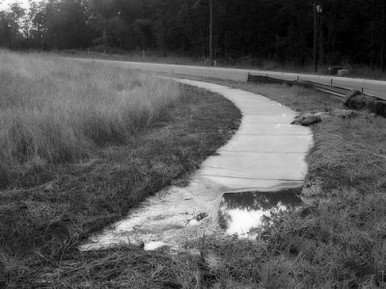 Navigating America’s suburban sprawl without an automobile is almost impossible as well as dangerous. Without sidewalks (or bicycle lanes) the automobile reigns supreme. The only safe way to avoid captivity in your suburban home is to submit to the imperatives of a fossil fuel economy, risk life and limb alongside speeding traffic, or flee the suburbs for the city or the country. There is something virtuous about sidewalks in providing a safe, effective means for people who prefer to walk rather than drive. However sidewalks have their limitations. Having a sidewalk may be better than not having a sidewalk. The sidewalk may take you where you want to go; but sidewalks only take you where those who poured the sidewalk wanted you to go. As Shel Silverstein reminded us long ago: the adventure begins where the sidewalk ends.1 I want to draw upon Silverstein’s metaphor to explore the practice of spiritual disciplines in contemporary radical Christian practice. Classic spiritual disciplines have their necessary function. They should be taken more seriously than they often are. My thesis however is that the classic practices of formation do not form radical Christians because they were never intended to. If we are seeking the formation of twenty-first century Christian communities capable of solidarity and resistance to empire and civilization we may need to draw upon spiritual practices outside the norm represented by our Christian tradition. Our imperial, civilized selves practicing disciplines shaped by imperial, civilized traditions can never upend imperial, civilized institutions. The emergence of an evangelical fascination with classical Christian spiritual formation and the practice of spiritual disciplines began in 1978 with the publication of Richard Foster’s Celebration of Discipline.2 Evangelicals began to practice contemplative prayer, go on retreats, seek spiritual directors, and read classic spiritual works by Catholic and Orthodox authors. Evangelicals were seeking wisdom deeper than that available in the limited resources of their own tradition. They were motivated by the belief that the spiritual resources of the Christian past were a much needed antidote to contemporary theological and spiritual ills. Foster’s efforts were reacting to the narrow, artery-hardening effects of fundamentalism’s overemphasis on pragmatism and cognitive belief; and its anti-traditionalism and sectarian paranoia regarding Catholicism and Orthodoxy. It also countered a neglect of the role of human agency in the everyday practice of grace – going beyond conversion, the mere forgiveness of sins and the assurance of salvation. It is impossible for anyone raised during the past quarter century to imagine how rigid denominational distinctions were fifty years ago. Both American social mobility and the emergence of the charismatic movement began to break down the barriers of American sectarian experience. Christian teachers like Foster, Dallas Willard, and Eugene Peterson began to write and lecture on the contribution that human agency through the activity of body, mind, and spirit could make to the reception of spiritual power, character formation and spiritual maturity. There was a new emphasis in their work on what God was already doing in the world and how Christians could be trained and taught to enter into that activity through the practice of classic Christian spiritual disciplines. The definition of discipleship expanded beyond fundamentalism’s emphasis upon evangelism and Bible memorization. But reflection upon the practical impact of this surge of teaching on spiritual formation results in a disappointing conclusion. The church’s abiding obsession with the ABCs (attendance, building, cash) keeps the lid on any impulse that would lead beyond taken for granted reality. Even the most fervent and disciplined practice of classic Christian disciplines will not necessarily lead to the formation of Christian communities capable of manifesting the fullness of life and withstanding the forces of globalization and neoliberal empire. In fact, these disciplines may only result in alternative forms of conformity that threaten little of the reigning order. Many of the missionary orders serving as agents of colonialism and imperial expansion were the strongest proponents and practitioners of classical spiritual disciplines. It is not at all inconceivable that a totalitarian principality focused upon domination might also be obsessed with the practice of spiritual disciplines that shape and direct the subjectivity of its members. In fact, some form of spirituality is essential to a repressive order’s effectiveness. A liberatory spiritual practice will have to do more than help us internalize the imperatives of a Christian faith shaped by imperial objectives and civilizational demands. Going beyond where the sidewalk ends will mean venturing into territory where the powers never intended for us to go. Going beyond where the sidewalk ends means using the empire’s maps to find those places that are either uncharted, or purposefully neglected and obscured by imperial cartographers. Almost every element of American society acts as an agent of spiritual formation. Public education for example is not about imparting the skills to simply live on the earth; in fact, those skills are often overlooked. Public education (and most private education) is about shaping human subjectivity to conform us to the reigning order. It educates for our effective submission to ends predetermined by those in power. Expressions of media especially through television, movies, and popular music are powerfully forming of our sensibilities and desires. The global economy, the national tax structure, even local zoning regulations all contribute to shaping expectations and “needs” in ways that go unchecked by any countervailing power. Christian spirituality is for the most part a spirituality of the gaps touching only those areas not already under the control of the marketplace. There are no quick fixes to this dilemma. Home schooling, living off the grid, practicing tax resistance may all be useful practices and yet leave the civilized imperial ego intact. Joanna Macy has provided a helpful breakdown of the three main dimensions of the “work that reconnects”: 1. holding actions, to save lives and species; 2. alternative structures for a livable future; and 3. shift in consciousness, cognitive, perceptual, and spiritual.3 All three dimensions are essential and work together. “Holding actions” are simply forms of political activism and resistance that seek to slow the destructive forces at work in our world. The formation of alternative communities where members carry the future in their bones is also essential for sustaining that resistance and the hope that invigorates it. But beyond this is the pursuit of a shift in our everyday mentality and awareness, retraining our consciousness for the work of communal resistance and solidarity. Radical visionaries and prophets will not emerge from Christian communities shaped only by traditional Christian practices. Classic Christian spiritual disciplines make an essential contribution to the shaping of an alternative consciousness. They must be emphasized as a baseline aspect of contemporary discipleship. Christian communities that shape their lives around these practices will mature in ways that communities who neglect them will not. However, the practice of these classic Christian spiritual disciplines will only lead us where the sidewalk directs us to go. An apocalyptic discipleship intent on continuing Christian witness beyond the imminent collapse of imperial civilization will need to do more. Twenty-first century Christian formation begins where the sidewalk ends. Notes:
Comments
|
Disclaimer
The viewpoints expressed in each reader-submitted article are the authors own, and not an “official Jesus Radicals” position. For more on our editorial policies, visit our submissions page. If you want to contact an author or you have questions, suggestions, or concerns, please contact us. CategoriesAll Accountability Advent Anarchism Animal Liberation Anthropocentrism Appropriation Biblical Exegesis Book Reviews Bread Capitalism Catholic Worker Christmas Civilization Community Complicity Confessing Cultural Hegemony Decolonization Direct Action Easter Economics Feminism Heteropatriarchy Immigration Imperialism Intersectionality Jesus Justice Lent Liberation Theology Love Mutual Liberation Nation-state Nonviolence Occupy Othering Pacifisim Peace Pedagogies Of Liberation Police Privilege Property Queer Racism Resistance Resurrection Sexuality Solidarity Speciesism Spiritual Practices Technology Temptation Veganism Violence War What We're Reading On . . . White Supremacy Zionism ContributorsNekeisha Alayna Alexis
Amaryah Armstrong Autumn Brown HH Brownsmith Jarrod Cochran Chelsea Collonge Keith Hebden Ric Hudgens Liza Minno Bloom Jocelyn Perry Eda Ruhiye Uca Joanna Shenk Nichola Torbett Mark VanSteenwyk Gregory Williams Archives
October 2017
|
Search by typing & pressing enter


 RSS Feed
RSS Feed